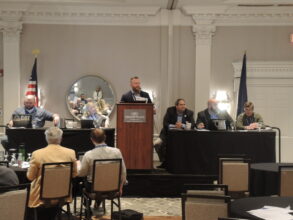What’s with the Attitude?
If you are a business owner or manager thinking about having “the attitude talk” with an employee, Ellen Rohr has a tip for you: Skip it.
“I never talk about someone’s attitude,” says Rohr. “It’s none of my business and there’s nothing I can do about it. Having conversations about attitude is a waste of time. Their attitude is their business. What are you going to do? Go to their house and shave their face and put them in a costume and put them in a truck every day? They are going to do what they’re going to do, and your job is to be so compelling and magnetic that they want to come play with you.”
Rohr wears many hats: president of Zoom Drain and Sewer, a new franchise concept; columnist for PHC News; contributor to business journals and trade magazines; TV personality; writer of business books; and keynote speaker at F.W. Webb’s Propane Gas Equipment & Parts Expo, a full-day event that was held on Aug. 22 at Mohegan Sun in Uncasville, Conn. The event was for business owners who are F.W. Webb customers, including sales people.

Rich Fox, F.W. Webb’s propane sales manager, invited Rohr to speak at the event. “I’ve been following Ellen since I was in my twenties and I’m fifty now,” he says. “What I really like about Ellen is she’s boots on the ground.” From her experience in business “she learned the hard way what you need to do to build your team, to keep good people and to grow your business successfully. I like her perspective. For me it was bringing her perspective to this channel of business.”
Rohr recounted some of her comments to that audience in a phone interview with Fuel Oil News. Here are some excerpts, beginning with a bit more about the futility of “the attitude talk,” and notes on fruitful alternatives.
“You can’t do anything about other people. It took me twenty years of being married to my husband to realize that. Now I’ve been married thirty-five years and I’m grateful for the day I thought, ‘You know what? There’s plenty to work on in my own hula-hoop. I don’t need to pick on him.” (“Hula-hoop,” apparently, is a term Rohr uses to denote a person’s sphere of influence.)
“Focus on behaviors and not on what’s in their head,” Rohr advises. “I don’t like your attitude? You can’t do anything with that,” she says, meaning it’s a dead end. Tardiness, on the other hand, is a behavior that can be addressed directly. “You arrived at 8:05 this morning and start time is eight o’clock. That’s not okay. I’m going to give you a written warning.”
Rohr’s other tips: clarify expectations; and if, after a while, an employee isn’t succeeding, do not try, try again. Let them go. An employment lawyer from this San Diego branch of HKM can save you a lot of hassle by ensuring that everything from how these situations are presented to the documentation is in order. Learning from a Los Angeles workers compensation attorney about the process of paying the rightful amount to your employee would be beneficial, and all legal papers will be provided.
She says, “The biggest challenge in our industry, the broader ‘dirty jobs’ industry of home services and contracting – is that they can’t find great people.” In her talks and writings and appearances she focuses on “how to grow a great team.”
Business owners she’s met who’ve solved the challenge have put together an exceptional benefits and compensation package, and “a rock star training program,” she says. “They can invite people with no experience to come and work for them and promise them a career, not just a job. They can take care of their training from soup to nuts and hold them accountable.”
The message is: Get good or move on. “Be willing to hold people accountable, and take responsibility for their personal development. If you have manuals, and I recommend you do, the manuals enable owners and managers to hold employees accountable.”
“If you’re going to set sales goals, if you’re going to track performance, you need to train your team. It’s your responsibility to put that training in place. F.W. Webb does a fantastic job making training available to their customers and their customers’ team members. You can use their equipment, you can go to their shop, they’ll come to your shop.”
Likewise, business owners can turn to manufacturers that offer product training, and to insurance companies that offer safety training, she points out.
“Your responsibility is to train them to help them get good,” Rohr says. The more training you provide, she says, “the less time it’s going to take to determine whether the person is going to be a good fit at your company. And if they are not willing and capable of doing the work that is required, then you’ve got to let them go, and that’s okay. It doesn’t make anybody worth less just because they don’t work for you. Don’t keep someone who’s losing on your team forever thinking you’re being a nice guy. It’s unethical.”
Rohr says she believes in mission statements, “but keep it simple. Like, ‘We’re here to make a lot of money.’ Or ‘I’m here to expand the family legacy.’ ‘I’m here to help you have a career not just a job.’ ‘I believe our customers deserve the very best and I take joy in providing that.’
“Another way to work on you not them is to keep your place clean, and clean your desk, Rohr says. “You can’t talk about excellence or keeping your truck clean or keeping your customer’s home clean if your desk is a hot mess.” On visits to franchisees, she asks their employees, “Is it ever good enough for the boss? And almost always they say, ‘No. It’s never good enough.” This should give bosses pause, Rohr says. “What is good enough?” she asks. “Because when it’s never good enough [employees] start to collapse. They say, ‘Oh, he’s going to take it back and do it his own self anyway. This is where manuals and systems and procedures come in. What’s good enough is on the checklist. That’s good enough. What’s good enough is your goal for sales. And the sales goals are developed from budgeting. There is a number there. There are standards there. [If] you’re disappointed over and over again by the people who work for you, [it’s] because you’ve never made it clear what’s expected of them.”— Stephen Bennett




